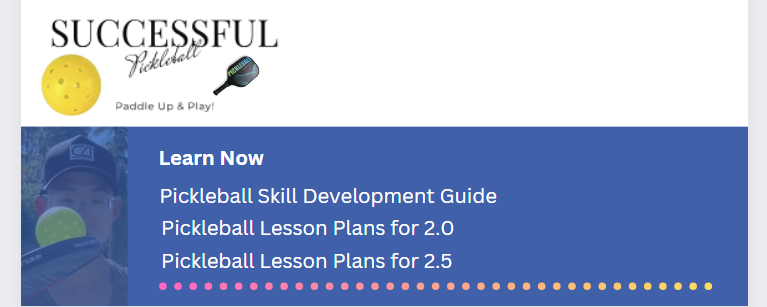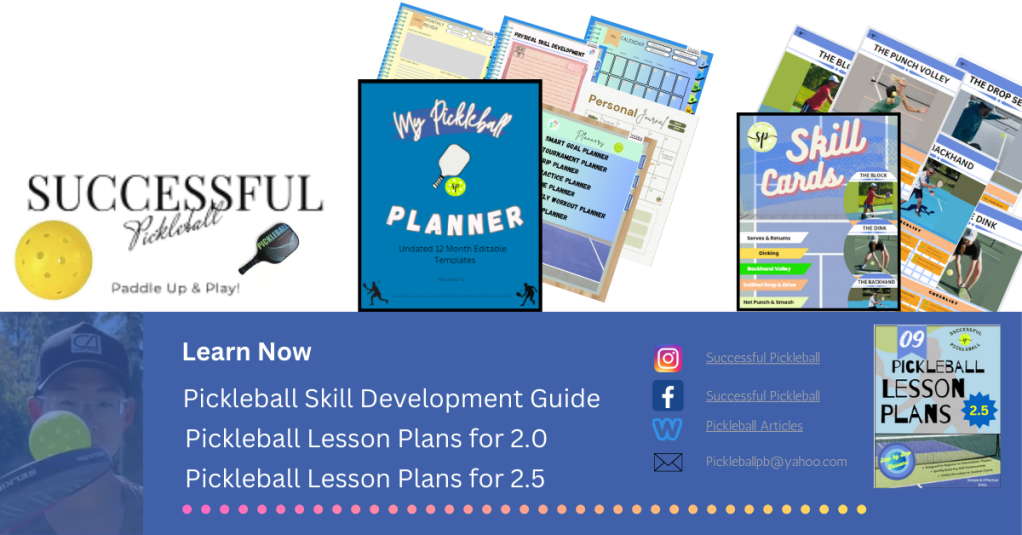On a white poster board, faded red and blue letters spell the words, “Never Give Up”, inspired by a childhood coach. The sign hangs in the garage above the makeshift home gym as a reminder of long ago battles won. The experience of these victories is utterly different than those of pickleball but the psychological impact never fades. The importance of preparing for a major tournament often includes peak physical fitness and fundamental skill development but what about performance gains through mental training?
Mental training has been founded on the assumption that psychological factors play a significant role in physical performance. Excessive levels of psychological stress disturb cognitive focus and lower the level of sport efficacy therefore to perform better, athletes must regulate excessive stress and negative emotions to perform better. Therefore, success in a tournament lies in the preparation prior to the tournament according to research in sports psychology. Performance is often hinged on personal well-being and mental efforts as a supplement to physical training. The general theoretical rationale for the use of mental training, according to Dr. P. Cohn, is to provide athletes with new skill that are effective in building a stronger mindset.
There are three major factors that impede the feeling of confidence and trust in ones’ game as per sports research.
High Expectations
When expectations are high, athletes will often feel the need to be perfect or need to meet or exceed high hopes. Heaping an extraordinary amount of pressure on themselves and constantly battle with anxiety is a negative strategy many athletes struggle with.
Comparison to Other Athletes
When athletes constantly gauge themselves with other athletes it is a recipe for unpleasant and disruptive emotional reactions like disappointment. Sometimes an astoundingly profound message will come from internalized emotions which will allow a more cognizant message of what what athletes measure themselves against. These emotions bubble up as sadness, anger, impatience, contempt, hate, anxiety, jealousy. These feelings are not only unpleasant, they make it hard to function in high stressful situations and can interfere with the ability to accomplish goals.
Persistent Fear
Fear halts progress. When you give in to fear, such as fear of embarrassment, fear of making mistakes, fear of failure, or fear that you lack ability or talent, you will hold back in training, play cautiously, consistently under perform and fall short of your goals.
Feeling comfortable with your game comes down to three words: PRACTICE, PRACTICE, PRACTICE! More on how to develop a practice regime next week.
Trust in your game isn’t developed overnight. Getting over the blocks within a tournament often comes down to a Competitive Mindset and developing a competitive mindset starts in practice. Athletes often attempt to work on too many aspects of their game simultaneously. One surefire way to work on your mental game is to practice a powerful mental tool called Visualization.
Set up a practice plan to help you improve various areas in your training with visualizing on how a certain skill will be performed with confidence. Visualization is a technique where you create a mental movie or mental images of accomplishing a particular skill like 3rd shot drop with little or no recoil. When you regularly visualize performing this skill successfully, you increase your belief and embed those images in your mind.

Visualization is a great tool to help with preparation and the ability to handle any pressure felt in the moment. When you visualize success, you build the self-confidence necessary to accomplish your skills. “Seeing” the results before they happen helps you believe with a feeling you can be do it and you can repeat the success of the shot over and over again. Technically, visualization uses specific and vivid images that elicit positive emotions.
To start visualizing, write down vivid details of the skill you want to experience with success. Immerse yourself in the experiences as fully as possible, include all your senses and how you will feel after accomplishing your goal. Get as vivid as possible because these images will leave a lasting impression on your mind, so when the event arises, you will feel that you have accomplished this feat before.
Here are 8 steps to Visualize your Skills
- Identify the skill you want to improve
- Write down the goal to make it real and solidify this as a visual reminder
- Create a Vision Board using images or symbols
- Use positive affirmations you can repeat to yourself and train your mind to focus on the positive
- Close your eyes and see yourself in your mind’s eye doing this skill
- Take Action by setting a plan to practice the skill you want to improve
- Celebrate your successes
- Stay focused and committed – don’t loose sight of what you want to achieve
Please Share
If you enjoyed our mental game tip, please forward this article to fellow athletes, teammates, or coaches who you think would appreciate it. As a gift please download our free warm up guide.
Next Steps
How to develop a Practice Regime

Feeling Prepared
When you feel prepared for competition, you will be more confident to play your best. Put in the time to work on your skills, trust in our training and be empowered by the abilities you possess. Your number one objective is to create a formula for success – practice, game plans, and mindset preparedness.
A game plan only works if you focus on putting your game plan into action during the competition. Your game plan is your blueprint for success or strategy to either perform well. or win over the competition.
Learn to Focus on you Plan
Often, when playing a tough team or facing a highly ranked opponent, athletes tend to fucus on what the opponent is doing or the rank of the opponent. Taking the focus off of your plan leads to under-performance and gives your opponent a distinct advantage because you are worried about what your competitors are doing.
Formulate a game plan – either taking advantage of your strengths or expose your competition weakness. No matter, create a strategy to focus on when the competition starts. Then, rehearse you game plane during the pregame routine. Breakdown your strategy into specific objectives which should be set prior to the game. In pickleball, there are 7 good strategies: serving, returns, passing shots, third shots, poaching, dinking, and stacking.
Confidence is not something that happens to you, building confidence is an action. If you are not a active participant in growing your confidence, you will be on a roller coaster ride of emotions.
Visualization
Visualization is the technical term for mentally rehearsing success inside you mind. It is not just imagining yourself executing a play – is not enough. You need to see and feel yourself do the motions with emotions. Emotional visualization connects the athlete to positive feelings within.
Before going to bed, imagine movements mastered at practice – anything good like best shots, best passes, or best movements. then deliberately imagine being at the next upcoming competition. Imagine being there and executing your top moves. If you are doing this right, you may experience nerves as if you are actually there. Don’t get distracted, it gets easier. Imagine your physical warm up routine, special music, activities between games, and scoring points during games. Make your pictures come alive. Transform your performance anxiety into excitement.
Secret Key to Emotional Visualization
Prepare for mental roadblocks – give the proper chance to do emotional visualization. Answer the questions below on a separate sheet of paper.
Write a few lines on what you experienced during a situation where you were out of control and experienced high anxiety during a game. What feelings did you have? Feel free to describe your thoughts, however, please feel free you also describe the emotions you had during this exercise.
Start doing emotional visualization at least three weeks before every big event. Try it right after practice or training. As you gain momentum, I strongly recommend visualizing before you fall asleep at night..even five minutes is great. Some athletes prefer to visualize immediately before competing. Others visualize an hour before their event, some only do it the night before. Try all three and see what works for you.
Affirmations
Affirmations can calm your frazzled nerves. Sometimes an event is so important you may become overwhelmed with performance anxiety. This means you have a strong case of the jitters. In this situation, you easiest way to reduce performance anxiety is to accept your nerves. Your body is asking you to be alert and activated. The easiest way to accept your nerves are to create a short-term strategy: an affirmation.
Exercise
Pick a situation that could occur in your event. Develop an affirmation about it that begins with, “It’s okay” …
It’s okay to feel powerless, it’s okay to miss shots, its okay to be clumsy, it’s okay to be anxious, or it’s okay to be frustrated”
Record your affirmations on a separate sheet of paper.
Repeat your affirmation to yourself as often as necessary in your routines to ease your performance anxiety. This strategy works because you’re not trying to manipulate yourself into being emotionally perfect, you are just trying to accept yourself.
Final Thoughts
Most athletes do not have an excellent pre-game routine and neglect to psyche up before big events. If you develop a routine that is unique to you, you will transform you nerves into excitement and perform your very best when it counts.










































One response to “Fitness Foundation: Mental Training Exercise”
[…] dedicated team spends a great deal of time conducting comprehensive searches and creating quality articles, strategy guides, rule explanations, and step-by-step tutorials to for our readers of every skill […]
LikeLike